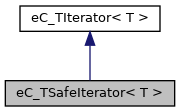An iterator that stays valid even if elements are deleted from the list. More...
#include <eC_TList_Iterators.h>

Public Member Functions | |
| eC_TSafeIterator () | |
| eC_TSafeIterator (const eC_TSafeIterator< T > &kIter) | |
| virtual eC_Bool | IsInsideList () const |
| eC_Bool | IsNextValid () const |
| eC_Bool | IsPreviousValid () const |
| eC_Bool | operator!= (const eC_TSafeIterator &kIter) |
| eC_TSafeIterator & | operator++ () |
| eC_TSafeIterator & | operator-- () |
| eC_TSafeIterator & | operator= (const eC_TSafeIterator &kIter) |
| eC_Bool | operator== (const eC_TSafeIterator &kIter) const |
 Public Member Functions inherited from eC_TIterator< T > Public Member Functions inherited from eC_TIterator< T > | |
| eC_TIterator () | |
| eC_TIterator (const eC_TIterator< T > &x) | |
| eC_TIterator (Node *pNode) | |
| virtual | ~eC_TIterator () |
| Destructor. | |
| virtual eC_Bool | IsInsideList () const |
| eC_Bool | IsValid () const |
| eC_Bool | operator!= (const eC_TIterator &kIter) const |
| T & | operator* () |
| eC_TIterator & | operator++ () |
| eC_TIterator | operator++ (int) |
| eC_TIterator & | operator-- () |
| eC_TIterator | operator-- (int) |
| eC_TIterator & | operator= (const eC_TIterator &kIter) |
| eC_Bool | operator== (const eC_TIterator &kIter) const |
| eC_Bool | operator== (const Node *const ptrNode) const |
Friends | |
| class | eC_TListDoubleLinked< T > |
Additional Inherited Members | |
 Protected Types inherited from eC_TIterator< T > Protected Types inherited from eC_TIterator< T > | |
| typedef ListNode< T > | Node |
| typedef for node | |
 Protected Member Functions inherited from eC_TIterator< T > Protected Member Functions inherited from eC_TIterator< T > | |
| Node * | GetNode () const |
 Protected Attributes inherited from eC_TIterator< T > Protected Attributes inherited from eC_TIterator< T > | |
| Node * | m_pNode |
| this node More... | |
Detailed Description
class eC_TSafeIterator< T >
An iterator that stays valid even if elements are deleted from the list.
With safe iterators it is possible to remove elements while iterating through a list.
With IsValid() it can be tested if the iterator may be dereferenced. If an item is deleted, the iterator is invalid, but you can still iterate through the list. After the next step (increment or decrement) the iterator is valid again (until you remove another element). After sorting and eC_TListDoubleLinked<T>::RemoveAll() all safe iterators are invalid and have to be set again.
Example:
If you remove an item and add one at the position of the removed element (in one iteration step) it is possible that the new element is "lost" in that iteration.
Example
3-5-8
5 is deleted 7 is added
3-7-8
In this case 7 will be "lost" if iterator pointed at 5, because iterator is now pointing at 7, and after next iteration step it will be pointing at 8.
Note: This iterator does not have postfix increment/decrement operators because implementing them for the current approach for this safe iterator is not effective.
Constructor & Destructor Documentation
◆ eC_TSafeIterator() [1/2]
|
inline |
Constructor needs pointer to list, iterator will be used with. This is necessary to register iterator in this list, so that iterators can be updated if list is modified.
◆ eC_TSafeIterator() [2/2]
|
inline |
Copy constructor.
- Parameters
-
kIter Where to copy from
Member Function Documentation
◆ IsInsideList()
|
inlinevirtual |
!DO NOT USE WHEN ITERATING BACKWARDS AND DELETING NODES! Use FOR_ALL_BACKWARD_SAFE instead. Used to test if iterator is not pointing beyond list.
- Returns
- True, if iterator is pointing an element of the list, false if iterator is pointing in front of first or behind last list element.
Reimplemented from eC_TIterator< T >.
◆ IsNextValid()
|
inline |
- Returns
- Returns if a valid node is available behind the current node.
◆ IsPreviousValid()
|
inline |
- Returns
- Returns if a valid node is available in front of the current node.
◆ operator!=()
|
inline |
Used to compare two Iterators.
- Parameters
-
kIter What to compare with
- Returns
- False, if iterators are pointing to the same list element and iterator would behave in the same way in case of iteration, True if not
◆ operator++()
|
inline |
Used to increment Iterator. Prefix version. Iterator is pointing to next list element.
- Returns
- Unchanged iterator. If current element is beyond the end of the list then an interator will be returned that will evaluate IsInsideList() to false, as before.
◆ operator--()
|
inline |
Used to decrement Iterator. Prefix version. Iterator is pointing to previous list element.
- Returns
- Unchanged iterator. If current element is beyond the beginning of the list then an interator will be returned that will evaluate IsInsideList() to false, as before.
◆ operator=()
|
inline |
Assignment operator.
- Returns
- eC_TSafeIterator& to local node after assignment
- Parameters
-
kIter Where to copy from
◆ operator==()
|
inline |
Used to compare two iterators.
- Parameters
-
kIter What to compare with
- Returns
- True, if iterators are pointing to the same list element and iterator would behave in the same way in case of iteration, False if not
The documentation for this class was generated from the following file:
